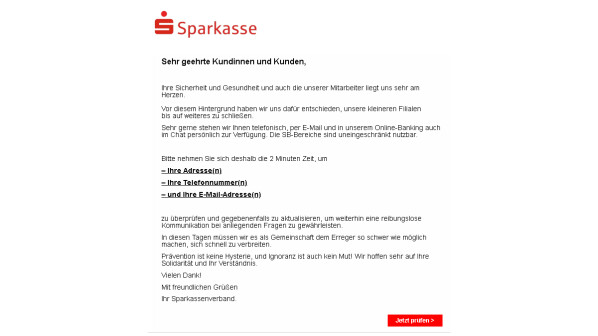Easily identify gruesome emails

There are currently reports of Sparkasse phishing, and these baits have taken measures against the corona virus. To keep you from falling into shameless scams, we show you news in examples.

Criminals use fear of the corona virus to send phishing. (Source: Sparkasse)
In March, phishing attempts particularly raised your fear of the spread of the corona virus. The Consumer Advisory Center illustrates this with Sparkasse phishing as an example, which is sent with the topic "Handling COVID-19 Pathogens". The text is as follows:
Dear Customer,
The safety and health of you and our employees is very important to us.
In this context, we decided to close smaller branches until further notice.
We are happy to provide you with personal services by phone, email and live chat. The self-service area can be used without restrictions.
So please take 2 minutes
"your address
"your phone number
»And your email address
Review and update if necessary to continue to ensure smooth communication with the issue.
Today, as a community, we must make it as difficult as possible for the rapid spread of pathogens.
Prevention is not hysterics, ignorance is not courage! We sincerely hope your unity and understanding.
thank you very much!
Sincerely
Your Sparkassenverband.
Check now
Phishing emails are very well worded and particularly boring. In phishing emails, calling for unity and solidarity during times of crisis simply means. Do not click on the link in the email or enter any data on this site. Even if the site looks serious, it is not the Sparkasse website.
Criminals can access your data through fake websites, and you may conduct further phishing attacks on the email addresses you use.
Pandemic is used in various scams
In addition to the phishing email, we recently reported some scams that worry about corona viruses. CovidLock, a ransomware that locks phones, is particularly serious. You should also protect yourself from misinformation with WhatsApp chain letters.
Shortly before this Corona virus phishing email appeared, we notified you of another scam in the form of a Sparkasse phishing. This rule applies in both cases: banks and companies never require you to enter personal data via email. Sparkasse confirmed this on their website. If you receive one of these messages, just delete it and forward it to the following address:
Did you receive a suspicious email?
Phishing checklist
-
Spelling mistakes? -
Is sensitive data required? -
Official logo? -
Unknown sender?
Do you also want to be kept informed of subsequent phishing emails? Then check back regularly in our news feed or follow Netwelt on Twitter and Facebook.
6 items
Popular scams: this is how scammers try to fool you online
Watch now
Keywords for this article
Current fraud warning
More information and sources










